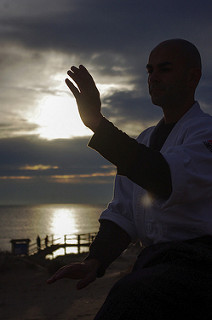How about an exercise that stretches your sore muscles, centers your scattered thoughts, and reduces your stress?
An exercise you can do in the privacy of your own home, whenever you need to—even in between projects? An exercise that not only improves your physical health, but your mental health as well—and that might even boost your creativity?
Have you tried tai chi?
If you haven’t, here are five reasons why you should. Turns out this exercise is ideal for writers and other creatives.
What is Tai Chi?
In case you’re not familiar, tai chi is a mind-body practice that originated in China as a martial art. Sometimes called a “moving meditation,” it’s a graceful form of exercise that involves a series of slow, careful movements performed in a focused manner while concentrating on the breath.
Though the practice began centuries ago as a way to defend oneself or to fight a battle, over time it became a way to experience many health benefits. One of the core concepts of the practice is to balance yin and yang, or the feminine and masculine forces in each of us, so to speak.
There are a number of different styles of tai chi, but they all share a goal of increasing strength, flexibility, and balance. Many practitioners believe that the flow of movements help get vital energy, called “qi,” moving throughout the system.
 5 Ways Tai Chi Can Benefit Writers
5 Ways Tai Chi Can Benefit Writers
There are a number of health benefits of tai chi. It’s a low-impact exercise, for example, which makes it a great option for those with knee, hip, or back problems who can’t manage other more pounding types of exercise.
It’s a weight-bearing exercise, however, as one has to support his or her own weight, so it can help maintain strong bones.
Tai chi is also an aerobic exercise. When you see someone practicing the slow movements, you may have a hard time believing that it would get your heart rate up, but it does just that. The combination of holding the poses, moving through them, and breathing deeply all work to get the heart pumping.
There are several other benefits, as well, that are particularly attractive for a writer or other creative artist.
 1. Tai chi gets you into the creative “zone.”
1. Tai chi gets you into the creative “zone.”
Researchers at Harvard talk about this. They note that at its most obvious level, tai chi promotes strength, flexibility, and balance, but that it holds a unique gift for creatives, as well—it helps you slip into the creative zone more easily.
You know how it is. You’re trying to fit writing into your busy day, but when you get that fifteen minutes to sit down and create, your brain won’t cooperate. It’s too overwhelmed with thoughts of everything else going on in your life to slow down enough to allow you to travel into that other world.
Tai chi can help.
“Tai Chi movements can help you slow down or quiet your mind, relax into the process, and dissolve psychological blockages, such as writer’s block,” the Harvard researchers wrote. “The process of writing takes tremendous concentration and perseverance. Tai Chi exercises can enhance energy while inducing a pleasant state of relaxation and help you develop your ability to let your thoughts flow naturally.”
 2. Tai chi helps you sleep.
2. Tai chi helps you sleep.
Writers often struggle with insomnia, but going without sleep is horrible for your health. Studies have linked getting less than 6 hours of sleep a night on a regular basis to an increased risk of heart disease, diabetes, and cancer, and even of premature mortality.
Unfortunately, insomnia can also derail your writing goals. There’s no doubt that writing takes a lot of energy. We need energy to get everything else done in our lives to leave time for writing, and also just to complete the act of writing itself. Studies have found that lack of sleep can lead to lack of focus and attention, and a reduced ability to make good decisions.
Tai chi can help improve sleep quality, and reduce the negative effects that insomnia can have on the body. When you don’t get enough sleep, for example, inflammation in the body increases, and inflammation is related to all the major diseases we face today. In a 2015 study, researchers split participants into three groups:
- Those receiving cognitive therapy for insomnia
- Those engaging in regular tai chi practice
- Those who went through a sleep seminar (considered the control group)
Results showed that both cognitive therapy and tai chi helped reduce insomnia symptoms, and reduced levels of C-reactive protein in the blood, which is a marker for inflammation.
 3. Tai chi relieves pain.
3. Tai chi relieves pain.
If you write full-time, or write and spend your day job at the computer, you know pain. All that sitting and hunching over the screen causes back pain, neck pain, sciatica, and more. Many writers also suffer from chronic pain, fibromyalgia, and joint pain.
Tai chi offers relieve for these ailments. A 2011 study, for example, found that it reduced pain intensity and disability in participants with persistent back pain. According to Harvard Medical School, research shows that tai chi helps people with arthritis, tension headaches, fibromyalgia, and other chronic pain conditions.
And according to a 2010 study, after going through 12 weeks of tai chi, patients suffering from fibromyalgia reported less pain, fewer depression symptoms, and better sleep.
An earlier 2007 study reported that was effective in reducing tension headaches and its impact on the sufferer’s day.
“A writer often sits long hours without moving,” says award-winning medical writer Mark L. Fuerst. “When I need a break from writing, I often do 10 minutes of simple Tai Chi exercises. This gets me up and moving after hours of sitting. The energy I gain from Tai Chi’s graceful movements not only can help focus my mind but also can energize my writing.”
 4. Tai chi relieves the symptoms of depression.
4. Tai chi relieves the symptoms of depression.
A writing career is a roller coaster, as any writer will tell you. There are ups and there are downs, and the downs can be devastating. Writers can easily fall into low moods, and sometimes it continues for more than a week or so, which can be detrimental to overall health, as well as to creativity.
Tai chi helps fight back depression. A meta-analysis of over 40 studies, for example, reported that tai chi had benefits on a range of psychological conditions, including depression, anxiety, and general stress management.
A 2011 study found that participants with depression who were treated with an antidepressant and two hours of tai chi per week were more likely to experience a greater reduction of depression symptoms than those who took the antidepressant and then simply went through two hours of health education. In other words, tai chi combined with the antidepressant was more effective than the antidepressant alone.
“Practicing tai chi reduces my stress and mental chatter,” says freelance writer John Soares. “It gets me out of my head and my monkey mind and into my body. I also almost always practice outdoors: that puts me in touch with the natural world, which is important to me.”
 5. Tai chi reduces stress.
5. Tai chi reduces stress.
Writing. Editing. Publishing. Marketing. Blogging. Speaking. Social media-ing.
Writers have to do it all these days, and the result is…S T R E S S.
Tai chi is a great way to combine exercise with stress relief (and meditation, by the way). In a 2007 study, researchers evaluated the effects of a tai chi intervention in young adults by measuring certain stress markers, like blood pressure, heart rate, and cortisol (stress hormone) levels, as well as self-perceived stress levels.
Results showed that after the tai chi, participants experienced significant reductions in cortisol levels and perceived mental stress, with improvements in overall well-being.
A later 2014 study reported that tai chi helped not only reduce stress, but dampened internal inflammation as well. According to a related article in Asian Scientist:
“Tai chi is a multidimensional behavioral therapy that integrates moderate physical activity, deep breathing and meditation to promote regulation of emotional and affective responses to stress.”
Another 2014 study found that tai chi could help breast cancer survivors for similar reasons—it’s ability to reduce stress and inflammation. Women who have gone through breast cancer are more likely to suffer from insomnia, which can increase inflammation—thereby increasing risk of recurrence.
Researchers from UCLA analyzed blood samples from 90 participants before and after starting tai chi, and found that when practicing tai chi, participants experienced a reduction in stress hormones. They added that the exercise relaxed the body to the point that inflammation also came down.
 Writing and Tai Chi May Work for You
Writing and Tai Chi May Work for You
There are some writers who have already discovered the unique way that tai chi and writing can go together.
Writes yogi and writer Kelley Grant:
“Quieting the mind through seated meditation, and moving meditations like yoga and tai chi, has become an important part of my life, and has focused my writing.” She adds, “…my writing doesn’t get derailed as much because of swirling activities and emotions. I am able to settle the mind, allow it to quiet and let the pictures form and ideas flow.”
Mystery writer Linze Brandon says:
“Practicing tai chi does not take much of my time every day, so I could still put in the two hours that I commit myself towards my creative writing. What did surprise me was the way practicing tai chi influenced my writing. I don’t believe it is the tai chi per say, but the meditative mindset that one develops when going through the motions.”
She adds that she often thinks of new ideas for her writing during her tai chi session, and that tai chi has helped her develop the discipline to stick to a daily writing practice.
If you’d like to get started with tai chi, you can look for a class in your area, try some of the exercise videos for beginners, or check out some books on the topic, like Tai Chi for Beginners and the 24 Forms, or Tai Chi for Dummies.
Do you practice tai chi? Have you found it to influence your writing? Please share your experiences with our readers.
Last picture photo credit: Sensei, II via photopin
Sources
“Tai Chi’s Synergy with Sports and Creative Arts such as Dance, Music, Painting, and Writing,” Summary and excerpts from: The Harvard Medical School Guide to Tai Chi, “12 Weeks to a Healthy Body, Strong Heart, and Sharp Mind,” by Peter Wayne, Ph.D., with Mark L. Fuerst, http://taichichuanberkeley.com/tai-chi-synergy-sports-creative-arts-dance-music-painting-writing/.
Michael R. Irwin, “Cognitive Behavioral Therapy and Tai Chi Reduce Cellular and Genomic Markers of Inflammation in Late-Life Insomnia: A Randomized Controlled Trial,” Behavioral Psychiatry, November 14, 2015; 78(10):721-729, http://www.biologicalpsychiatryjournal.com/article/S0006-3223%2815%2900079-7/abstract.
Hall AM, et al., “Tai chi exercise for treatment of pain and disability in people with persistent low back pain: a randomized controlled trial,” Arthritis Care Res (Hoboken), November 2011; 63(11):1576-83, http://www.ncbi.nlm.nih.gov/pubmed/22034119.
“Tai Chi and Chronic Pain,” Harvard Medical School, http://www.health.harvard.edu/alternative-and-complementary-medicine/tai-chi-and-chronic-pain.
Wang C., et al., “A randomized trial of tai chi for fibromyalgia,” N Engl J Med., August 19, 2010; 363(8):743-54, http://www.ncbi.nlm.nih.gov/pubmed/20818876.
Mark L. Fuerst, “How Tai Chi Can Improve Your Writing,” WriteNow.com, April 11, 2013, http://writenowcoach.com/how-tai-chi-can-improve-your-writing-by-mark-l-fuerst/.
Wang F., et al., “The effects of tai chi on depression, anxiety, and psychological well-being: a systematic review and meta-analysis,” Int J Behav Med., August 2014; 21(4):605-17, http://www.ncbi.nlm.nih.gov/pubmed/24078491.
Helen Lavretsky, et al., “Complementary Use of Tai Chi Chih Augments Escitalopram Treatment of Geriatric Depression: A Randomized Controlled Trial,” Am J Geriatr Psychiatry, October 2011; 19(10):839-850, http://www.ncbi.nlm.nih.gov/pmc/articles/PMC3136557/.
John Soares, “How Tai Chi Makes Me a Better Writer,” ProductiveWriters.com, August 18, 2015, http://productivewriters.com/2015/08/18/how-tai-chi-makes-me-a-better-writer/.
Abbott RB, et al., “A randomized controlled trial of tai chi for tension headaches,” Evid Based Complement Alternat Med., March 2007; 4(1):107-13, http://www.ncbi.nlm.nih.gov/pubmed/17342248?ordinalpos=2&itool=EntrezSystem2.PEntrez.Pubmed.Pubmed_ResultsPanel.Pubmed_DefaultReportPanel.Pubmed_RVDocSum.
Esch T., et al., “Mind/body techniques for physiological and psychological stress reduction: stress management via Tai Chi training—a pilot study,” Med Sci Monit., November 2007; 13(11):CR488-497, http://www.ncbi.nlm.nih.gov/pubmed/17968296?ordinalpos=3&itool=EntrezSystem2.PEntrez.Pubmed.Pubmed_ResultsPanel.Pubmed_RVDocSum.
Black D. S., “Tai Chi Meditation Effects on Nuclear Factor-xB Signaling in Lonely Older Adults: A Randomized Controlled Trial,” Psychother Psychosom., 2014; 83:315-317, http://www.karger.com/Article/Abstract/359956.
“Tai Chi Reduces Stress & Inflammation,” Asian Scientist, October 29, 2014, http://www.asianscientist.com/2014/10/health/tai-chi-reduces-stress-inflammation/.
Reggie Kumar, “UCLA study finds tai chi reduces inflammation in breast cancer survivors,” UCLA, November 6, 2014, http://newsroom.ucla.edu/releases/ucla-study-finds-tai-chi-reduces-inflammation-in-breast-cancer-survivors.


I can’t recommend tai chi highly enough! It is a full body/mind/spirit discipline with tremendous benefits in all areas, including help with concentration in order to be a more productive writer. It took me 3 years to learn the full long Lee-modified Yang form, but it was worth all the time to do so, for now I can do it any time, any place. Qi Gong breathing also helps clear the head and ready the mind to write.
Sounds fantastic, Katy. I love my yoga, but I’m going to try this soon.
I love Tai Chi! It is great for writers who are sitting all day at the computer. I have been taking classes for over a year, and appreciate the various benefits, especially the movements that require all my concentration, blocking the “monkey chatter”.
As a member of Novelists, Inc., I have asked my fellow members if anyone else wants to join me in the morning during our next conference in St. Petersburg, FL in September. Weather permitting, I’ll be doing Tai Chi in the sand on the beach!
Oh cool, Gillian! That would be awesome. Would love to see a group of writers taking part in that healthy activity. And on the beach! Send pics! :O)
I am a Tai Chi Instructor and have found it a great way of de-stressing after work at the day job of consultancy (very desk and computer based). If I get stuck writing a small break to practice the form will help ease the flow. I am also an artist and I can testify that Tai Chi helps calm me down to the stillness required to create my art.
Cool, Dorothy! Great to hear from an artist who’s practicing tai chi and experiencing the real benefits. Thanks for sharing.
As a Tai chi and Qigong instructor, I LOVE the article (in spite of “stock” photos, which don’t demonstrate good Tai Chi alignment or sleep hygiene) and have posted link to my FB page. I can’t wait to design a workshop specifically for writers! Many many thanks for the information on writing and wellness.
Thanks, Barbara! Great to hear that from an instructor. How exciting—a workshop for writers! Please do let us know when you have that available!
I have been doing Tai Chi Chih exercises daily for the past seven years. I’ve found it helps my cervical strain and gives me energy and a refreshed attitude towards life. This form of Tai Chi consists of 20 movements and the time is usually under 30 minutes to perform. I recommend anyone who is contemplating exercise to consider Tai Chi as a viable form that will bring enhancement to your life. I am also writing my first novel and now in process of editing the 2nd draft. This form of exercise brings me more motivation and creativity in my writing life. Thanks for providing the proof that Tai Chi is such an asset to the writing, bringing new ideas and discipline to every area of living.
A writer who does tai chi! So glad you wrote in, Kathy. Great advice—thank you.